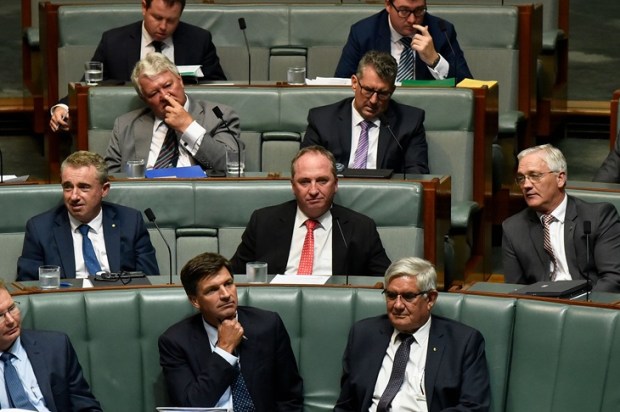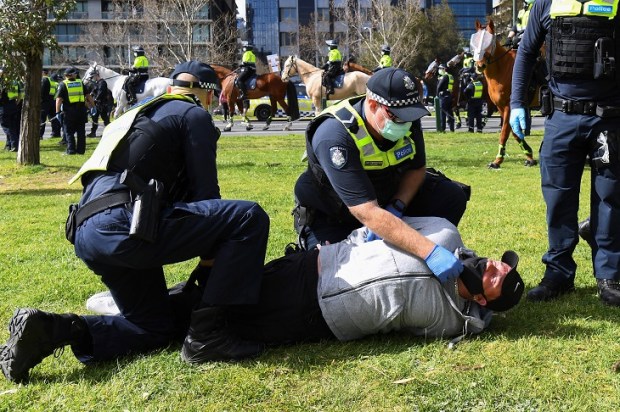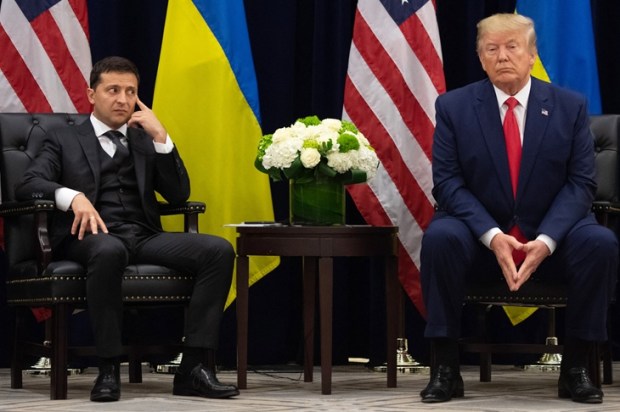Former Prime Minister Scott Morrison was the first Australian leader to propose the addition of the ‘First Nations Voice’ to our federal Parliament – a standing consultative body to advise the government on laws and policies arguably affecting Aboriginal community but, potentially, the nation as a whole. Accordingly, supporters of the ‘Voice’ in our federal Parliament are now relentlessly promoting the ‘Uluru Statement From The Heart’. For example, early in his victory speech on election day, in May 2022, the Prime Minister, Anthony Albanese, declared: ‘I commit to the Uluru Statement From The Heart in full.’
The Uluru Statement From The Heart basically asks Australians to establish a ‘First Nations Voice to Parliament’ enshrined in their Constitution. After stating that the Indigenous tribes ‘were the first sovereign Nations of the Australian continent’, the Statement declares the following:
This sovereignty is a spiritual notion: the ancestral tie between the land, or ‘mother nature’, and the Aboriginal and Torres Strait Islander peoples who were born therefrom, remain attached thereto, and must one day return thither to be united with our ancestors. This link is the basis of the ownership of the soil, or better, of sovereignty.
Political writer and commentator Dave Pellowe, referring to this Statement in a recent episode of The Church and State Show, has recently remarked: ‘It is a religious text, laden with pagan beliefs like animism and ancestor worship. It literally describes Aboriginal sovereignty over this continent as a spiritual and sacred notion: the land as an entity they are born from, remain attached to, and return to upon their death. The text’s supporters agree this religious belief is the basis of Aboriginal ownership of the land.’ He concludes that, if his assessment of the Statement is correct, then it comes ‘awfully close to violating Section 116 of the Constitution’.
Pellowe’s view offers an interesting perspective, thus far missing from the divisive ‘Voice’ debate and, therefore, it merits further investigation. Indeed, Section 116 of the Constitution explicitly stipulates:
The Commonwealth shall not make any law for establishing any religion, or for imposing any religious observance … and no religious test shall be required as a qualification for any office or public trust under the Commonwealth.
Arguably, any assessment of the Uluru Statement From The Heart in the light of Section 116 of the Constitution must obviously seek to ascertain whether the Statement constitutes a ‘religion’, consisting of beliefs, ideas, and practices which are religious in character and are relied upon by the government in its push to entrench the ‘Voice’ in the Constitution.
The High Court has indicated that it is difficult, even daunting, to attempt to define the concept of ‘religion’. This difficulty was acknowledged by Latham C.J. in Adelaide Company of Jehovah’s Witnesses Inc v Commonwealth, when he said, ‘It would be difficult, if not impossible, to devise a definition of religion which would satisfy the adherents of all the many and various religions which exist or have existed.’
Indeed, it is not surprising for the High Court, when faced with the issue of determining whether a particular set of beliefs constitutes ‘religion’, to highlight the difficulties which are invariably associated with any attempt to define the term. For example, in Church of the New Faith v. Commissioner for Pay Roll Tax (Vic.), the Court was asked to determine whether the tenets of the Church of Scientology constitute religion for the purposes of Section 116 of the Constitution.
An affirmative answer would have made the church eligible to apply for tax-exempt status. Although ‘an excess of verbiage’ was devoted to the extrapolation of the tests or criteria of a religion, confusion remained. Chief Justice Mason and Justice Brennan argued in Church of the New Faith that, ‘…for the purposes of the law, the criteria of religion are twofold; first, belief in a supernatural Being, Thing or Principle; and second, the acceptance of canons of conduct in order to give effect to that belief.’
This opinion is particularly interesting because it suggests that, belief which does not require action in accordance with these beliefs, might not be sufficient to constitute a religion. Similarly, Wilson J. and Deane J. submitted that a set of beliefs which do not relate to things supernatural, is not likely to be recognised as a religion.
If the High Court were to liberally interpret the concept of ‘religion’ as embracing any set of ideas and practices, which one believes will lead to liberation or fulfilment of one’s being, then the Uluru Statement From The Heart certainly qualifies as a ‘religious’ statement. The description of ‘sovereignty’ as a ‘spiritual notion’ that encapsulates the belief of Indigenous people surely comes close to a ‘Supernatural … Thing or Principle’ which serves as the rallying point of those who want to entrench the ‘Voice’ in the Constitution. Of course, a liberal and wide definition of ‘religion’, which involves the characterisation of any set of beliefs as religion, would be open to the objection that it is operationally meaningless since it is incapable of being used to recognise different kinds of beliefs.
In this context, the religious nature of the Uluru Statement From the Heart is relevant because the ‘Voice’ proposal is based on, and inspired by, this Statement. The government’s unqualified adoption and implementation of the Statement and its tenacious promotion of the ‘Voice’ could thus be characterised as an establishment of religion in Australia and the imposition of religious observance on people in society. In addition, those who aspire to serve on the ‘Voice’, if it were to be successful, would need to qualify as ardent proponents of the Uluru Statement From the Heart, thereby also potentially violating the Constitutional directive that no religious test shall be used to determine the suitability of people for government positions.
It goes without saying that the Constitution treats everyone equally and a referendum adding such a ‘Voice’ to Parliament would not unite us, but further divide us along lines of race and ancestry. Arguably, one of the great virtues of our Constitution is precisely its equal treatment of all citizens regardless of race, culture or origin. It is improperly divisive, therefore, to use this equalitarian constitutional text to privilege one racial or religious group over the rest of the population. Of course, Section 25 of the Australian Constitution is often interpreted by advocates of constitutional recognition as contemplating a denial of the franchise on racial grounds. This Section reads:
For the purposes of the last section, if by the law of any State all persons of any race are disqualified from voting at elections for the more numerous House of the Parliament of the State, then, in reckoning the number of the people of the State or of the Commonwealth, persons of that race resident in that State shall not be counted.
The reason that this Section was included in the Constitution is because, in the 1890s, Queensland and Western Australia practised racial discrimination by not allowing people of exclusive Aboriginal ethnicity to vote in state elections. The framers thought this was wrong and wanted to bring those states into line with all the others, where Aborigines already had the franchise. Accordingly, Section 25 is an anti-racist provision designed to penalise those Australian states that still discriminated against Aborigines by reducing their representation in the newly created Commonwealth Parliament. In other words, rather than denying Aboriginal people the franchise the original drafters of our Constitutional supported giving Aborigines voting rights from the very outset.
Finally, it could be asked whether governments (and even courts) have a right to examine whether a set of beliefs constitutes a ‘religion’. This is because a set of beliefs may be regarded by its adherents as constituting a religion, even though they may not come within the criteria applied by the High Court or the ruling elites. Be that as it may, in Torcaso v Watkins the US Supreme Court listed a number of ‘religions […] which do not teach what would generally be considered a belief in the existence of God’ such as Buddhism, Taoism, Ethical Culture, and Secular Humanism.
If the above statement may be considered valid, then the notion of ‘Aboriginal spirituality’ would definitely involve an unconstitutional establishment of religion. In the case of the Uluru Statement From The Heart, the religious foundations of the ‘Voice’ based on ‘sovereignty’ as a ‘spiritual notion’ can hardly be denied. Such Statement is clearly a religious document because it explicitly articulates nature worship and ancestor worship. The writers speak of Aboriginal sovereignty in terms of ‘a spiritual notion: the ancestral tie between the land, or ‘mother nature’, and the Aboriginal and Torres Strait Islander peoples who were born therefrom, remain attached thereto, and must one day return thither to be united with our ancestors’. It is this spiritual bond that the writers say gives them claim on the land.
It is thus time to consider the religious dimension of the proposed entrenchment of the ‘Voice’ to Parliament as per the ‘Uluru Statement From The Heart’, which must be considered particularly in light of Section 116 of the Australian Constitution that prohibits any establishment of religion.
Gabriël A. Moens AM is an emeritus professor of law at the University of Queensland, and served as pro vice-chancellor and dean at Murdoch University. In 2003, Moens was awarded the Australian Centenary Medal by the prime minister for services to education. He has taught extensively across Australia, Asia, Europe, and the United States. He is the co-author of The Constitution of the Commonwealth of Australian Annotated (9th ed, LexisNexis, 2016).
Augusto Zimmermann is head of law at Sheridan Institute of Higher Education, in Perth, Western Australia. He is a former commissioner with the Law Reform Commission of Western Australia (2012-2017) and also a former associate dean (research) at Murdoch University, School of Law. During his time at Murdoch, Professor Zimmermann was awarded the Vice Chancellor’s Award for Excellence in Research, in 2012.
Professor Zimmermann and Professor Moens are the authors of Foundations of the Australian Legal System: History, Theory and Practice (LexisNexis, 2023).

























